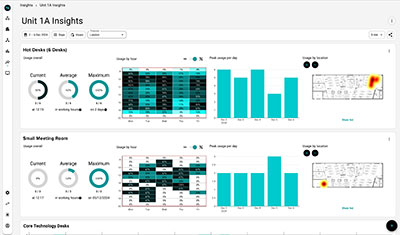London-based A/V integrator Tateside has adopted the smart office workspace building platform Neowit, becoming one of the first integrators in the UK to adopt the Oslo-based company’s technology. Tateside has already employed the solution at the headquarters of leading UK companies, including those of a Formula 1 racing team.
 Neowit offers an innovative approach to the challenges posed by ghost meetings and inefficient data on workspace use. Their brand-agnostic smart office and meeting room platform takes data from existing devices such as video conferencing bars, room occupancy sensors, desk sensors, lighting and thermostats to collect insights on the frequency of use and average occupancy of meeting rooms and wider office spaces.
Neowit offers an innovative approach to the challenges posed by ghost meetings and inefficient data on workspace use. Their brand-agnostic smart office and meeting room platform takes data from existing devices such as video conferencing bars, room occupancy sensors, desk sensors, lighting and thermostats to collect insights on the frequency of use and average occupancy of meeting rooms and wider office spaces.
When integrated with room scheduling tools, it can quickly identify ghost meetings and free unused rooms for improved efficiency. This information, displayed via Neowit’s clear and attractive user interface, unlocks an unprecedented level of analytics on the use of office spaces.
As increasing numbers of hardware manufacturers include sensors and data capture tools in their devices, the market has lacked a dedicated tool or platform to aggregate all of this data. ‘With Neowit we can show clients a visual representation of these insights,’ says Tateside Technical Director, JackCornish. ‘Neowit provides both live data and, importantly, historical trends, something our clients haven’t had access to before.’
Beyond overcoming the everyday inconvenience of ghost meetings, the insights collected through Neowit’s technology speak to the siloed parties of IT professionals and facilities management personnel. While IT departments, who are concerned with delivering the best possible meeting room experience, can work more efficiently thanks to the automatic booking capabilities and identification and removal of ghost meetings, facilities managers can expect to see an overall increase in office utilisation and gain visibility on building inefficiencies. The use of Neowit serves both these parties and bridges the gap for greater collaboration.
‘Through our implementation of Neowit as part of the overall A/V integration we offer, our clients are able to better understand how their workforce prefers to use the space,’ Cornish says. ‘In a post-pandemic world, it’s been a struggle to get people back into the office, and visualising trends of work through data helps companies make informed decisions on how to best engage and encourage a productive and happy workforce.’
With the data collected in Neowit, employers have a solid basis for resource planning. These datasets also reveal whether the company is in need of more boardrooms or would be better served by several small huddle rooms instead. ‘In Norway, we worked with a law firm that implemented Neowit into its new offices,’ says Neowit co-founder, Patrik Forsberg. ‘After collecting insights with our software over three months, they completely reconfigured the space to serve a clear demand for smaller meeting rooms as they could see that all the larger meeting spaces were being used for small group meetings. Without the data coming into Neowit, these inefficiencies may have gone unnoticed for years.’
‘Our F1 client is, understandably, big on data, and being able to offer them a tool that provides a level of information they’ve never had before is great,’ Cornish continues. ‘Previously, they suffered from regular ghost meetings, so Neowit has been able to track this so they can take the steps internally to curb these inefficiencies. Looking to the future, they can use these insights to design new meeting rooms that better suit their evolving needs, capacity, and the working trends of their employees.
‘At the moment, data is coming from devices and being displayed in Neowit,’ Cornish continues. ‘We’re excited for this communication to happen in the opposite direction, for example, the data in Neowit triggering actions in the room, such as automatically shutting off lighting and devices in the case of ghost meetings.’
As companies work to meet ESG standards, including creating suitable workspaces for employees, Tateside’s investment in this technology positions it as one of the UK’s most forward-thinking workplace technology providers.
‘Ensuring correct usage and capacity is important to companies, while co-working spaces can greatly benefit from implementing Neowit to increase efficiency and potential turnover,’ Cornish says. ‘People across the industry are aware that these challenges exist in modern meeting spaces – Neowit provides the hard data to confirm these suspicions and justify actionable changes.’
Through it use of Neowit, Tateside hopes to lead the wider adoption of smart workspace analytics in the UK.

